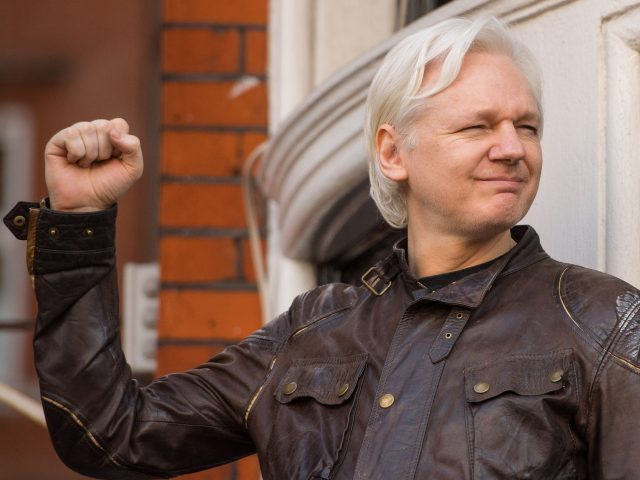
Julian Assange has signalled he will remain inside the Ecuadorian embassy in London despite the Swedish authorities suddenly dropping a seven-year investigation against him.
The WikiLeaks founder made a rare appearance on the balcony of the central London building to hail the decision by Sweden’s Director of Public Prosecutions as an “important victory”.
He gave a clenched fist salute to his supporters, and scores of journalists and TV crews, before maintaining that a “legal conflict” with the United States and the UK continues.
The Australian, who has lived inside the embassy for almost five years, said the “road is far from over”, adding it was “extremely regretful” he was still being threatened with arrest if he leaves the embassy.
Mr Assange said he had spent seven years either under house arrest or living inside the embassy, without charge, as he faced sex-related allegations in Sweden, which he has always denied.
He had missed seeing his children growing up. “That is not something I can forgive, or forget,” he said, maintaining that he had been the victim of a “terrible injustice”.
Detention and extradition without charge had become a feature of the EU, but it was not something expected from the rule of law in the UK, he said.
Mr Assange thanked the government of Ecuador for granting him political asylum despite “intense pressure”, as well as his legal team and others who had stood by him.
“We have today won an important victory, but the road is far from over. The proper war is just commencing.”
Detained for 7 years without charge by while my children grew up and my name was slandered. I do not forgive or forget.
— Julian Assange (@JulianAssange) May 19, 2017
He pledged that WikiLeaks will continue distributing material about the activities of the CIA in the United States and will “accelerate” its publications.
“The claim that the UK has the right to arrest me for seeking asylum in a case where there have been no charges is simply untenable.
“My legal staff have contacted the UK authorities and we hope to engage in a dialogue about what is the best way forward.”

Mr Assange said the UK had refused to confirm or deny whether there is a warrant from the US for his extradition, insisting he was happy to talk to the US Justice Department.
He returned into the building which has been his home for almost five years, without answering questions.
The Ecuadorian government is to step up efforts to allow Mr Assange to continue his asylum in its country after Sweden’s Director of Public Prosecutions Marianne Ny said she had decided to “discontinue” her investigation.
Scotland Yard said it was obliged to execute a warrant issued by Westminster Magistrates’ Court for the arrest of Mr Assange following his failure to surrender to the court in June 2012, should he leave the embassy.


Comments: Our rules
We want our comments to be a lively and valuable part of our community - a place where readers can debate and engage with the most important local issues. The ability to comment on our stories is a privilege, not a right, however, and that privilege may be withdrawn if it is abused or misused.
Please report any comments that break our rules.
Read the rules here